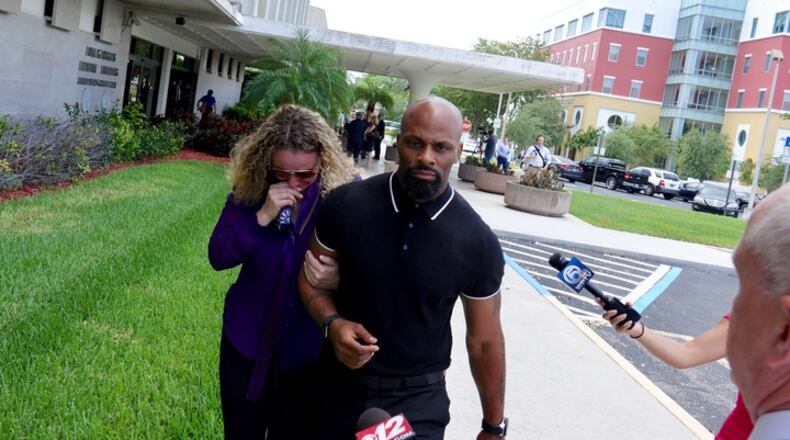“Our goal was to shut him down, to get him off the street,” she said.
On Wednesday, in a packed courtroom divided by Chatman’s family and Chatman’s victims, Middlebrooks gave Chatman a 27 ½-year sentence for crimes that Villafaña said were never before seen in a federal court: turning his patients into prostitutes.
Chatman, 46, can appeal the sentence, which would see him released at age 74. The sentence calls for him to register as a sex offender.
He said nothing, even as angry parents berated him in front of Middlebrooks, and showed no emotion when the judge announced the sentence.
“This man ran an addiction brothel,” said Jerry Smith, whose son, Schuyler, went to Chatman’s Reflections Treatment Center in Margate twice, after Chatman lured him back from a treatment center in Louisiana. “He’s worse than a pedophile.”
Tina Pekar, whose son, Ryan, overdosed and died in one of Chatman’s sober homes in 2014, trembled with grief and rage as she stood just feet away from Chatman. She recalled when she turned to Chatman for answers after her son’s death and he replied, “Ryan who?”
“You destroyed my life,” she said. “Do you remember my son now?”
Pekar then turned toward Chatman’s distraught wife, Laura, who was sentenced to three years in prison for pretending on paperwork to be the real owner of her husband’s facilities. Because Chatman was a felon, he couldn’t open a treatment center in his name.
“You’re just as bad as your husband,” Pekar said, as Laura looked back, red-eyed, shaking her head “no.”
Laura Chatman, 44, a mother of four, spent most of the hearing with her hand covering her face. She repeatedly apologized before Middlebrooks.
“I can’t even imagine what the families are going through, and I’m so sorry,” she said, crying. “I am truly sorry for your losses.”
Afterward, she hugged and apologized to Jennifer Flory, whose daughter, Alison, overdosed and died in a Chatman-linked sober home in 2016, Flory said.
Laura Chatman’s lawyers described her as an unwitting accomplice in her husband’s “house of horrors.”
Kenny Chatman admitted to keeping some of his female patients locked up in a Mangonia Park home and pimping them out on various websites. He withheld other patients’ medications and food stamps to control them. And he allowed anyone to do drugs in his sober homes, as long as he could keep billing their insurance.
One woman told Middlebrooks that Chatman kept her shackled in a home, where, during four weeks in 2015, more than 100 men paid him to rape her. She was just 19.
“I recall close to 150 in total, different faces of rapists abusing me daily over a period of three to four weeks,” the woman said in court. “I was unrestrained for brief periods, only to be cleaned up of bodily fluids. I thought I was going to die there.”
She said she escaped wearing only a T-shirt, and went to police. Afterward, Chatman found her and forced her to sign a statement recanting the allegations, she said. FBI agents later found the statement in Chatman’s office safe.
Villafaña, seated next to lead FBI agent Bill Stewart, said Wednesday that Chatman was pimping women out to “fetish customers.” When the women resisted, he would tell them, “Who are you to say no?” Villafaña said.
She also said that Chatman was having sex with his patients, bragging that he could sleep with any one of them for $50. When they got pregnant, he forced them to get abortions, Villafaña said.
“The amount of suffering is unprecedented,” she said. “There is no one quite like Mr. Chatman.”
Chatman’s lawyer, Saam Zangeneh, argued that his client was a victim of South Florida’s largely corrupt drug-treatment industry.
He had no experience in drug treatment when he opened his first sober home in 2012, and he leaned on others for guidance.
“He walked into an industry that is infected,” Zangeneh said. “He became another infected member.”
He argued that Chatman deserved just 14 years behind bars, partly because his actions were tacitly endorsed by the Department of Children and Families, which licenses and regulates treatment centers. This past year, DCF allowed him to open a second treatment center, in Lake Worth.
MORE ON DCF: Florida’s first responders to child abuse overwhelmed, inexperienced
After the sentencing, most of the families who lost their loved ones said they were satisfied with the verdict.
"I don't think any amount of time could take away any of the pain he caused," said Michelle Curran, whose daughter, Mikaya Feucht, overdosed and died in a Boynton Beach motel room this past year.
Chatman's activities were first detailed in a December 2015 Palm Beach Post story based on then-unconnected police reports and interviews with addicts and Reflections employees. At the time, he denied owning any sober homes, relying, apparently, on the paperwork mirage that authorities unraveled.
His treatment centers were anything but: Doctors rubber-stamped outrageously expensive and unnecessary drug tests, DNA tests and allergy tests. Sometimes Reflections employees were the ones submitting the samples. As many as 90 percent of his patients were doing drugs, his former clinical treatment director told the FBI.
That clinical treatment director was sentenced in April to four years and nine months in prison. Four other associates have pleaded guilty and one other has been charged.
Although Chatman faced up to life in prison, Villafaña asked for 35 years. She said with the number of other corrupt treatment center operators the FBI is investigating, she’ll need to convince them to take plea deals, and giving Chatman a life sentence after taking a plea deal could discourage them to confess.
WHAT THE POST REPORTED
The Post pieced together police reports and witness testimony in December 2015 to expose Kenneth "Kenny" Chatman as an operator who allowed drug use in his sober homes and forced addicts into prostitution. One year later, a federal investigation led to his arrest and prosecution. Read the coverage at MyPalmBeachPost.com
